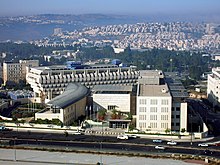Israeli Foreign Ministry
| משרד החוץ وزارة الخارجية الإسرائيلية |
|
 Ministry of Foreign Affairs Headquarters |
|
| Agency overview | |
|---|---|
| Formed | 1948 |
| Jurisdiction | Government of Israel |
| Headquarters | Foreign Ministry Building, Givat Ram, Jerusalem 31°46′57.35″N 35°12′6.19″E / 31.7825972°N 35.2017194°ECoordinates: 31°46′57.35″N 35°12′6.19″E / 31.7825972°N 35.2017194°E |
| Annual budget | 1.59 billion New Shekel |
| Ministers responsible |
|
| Website | www |
The Israeli Ministry of Foreign Affairs (Hebrew: מִשְׂרַד הַחוּץ, translit. Misrad HaHutz; Arabic: وزارة الخارجية الإسرائيلية) is one of the most important ministries in the Israeli government. The ministry's role is to implement Israel's foreign policy, and promote economic, cultural, and scientific relations with other countries.
The Ministry of Foreign Affairs is located in the government complex in Givat Ram, Jerusalem. Prime Minister Benjamin Netanyahu currently holds the Foreign Ministry post.
In the early months of 1948, when the government of the future State of Israel was being formed, the Ministry of Foreign Affairs was housed in a building in the abandoned Templer village of Sarona, on the outskirts of Tel Aviv. Moshe Sharett, formerly head of the Political Department of the Jewish Agency, was placed in charge of foreign relations, with Walter Eytan as Director General.
In November 2013, the longest labor dispute in the history of the Foreign Ministry’s workers union came to an end when diplomats signed an agreement that would increase their salaries and improve their working conditions. A new organization was founded, the Israeli Association for Diplomacy, with the mission of promoting the interests of Foreign Ministry staff. In response to issues raised, MK Ronen Hoffman arranged for the Knesset to launch a caucus entitled the “Caucus for the strengthening of the foreign service and Israeli diplomacy” in December 2014. Joined by politicians across the political spectrum, Hoffman said, “As long as the security establishment and the army are preferred over the foreign service, national security is damaged. A country whose foreign service doesn’t take a central position doesn’t act in the best national interest.”
...
Wikipedia
